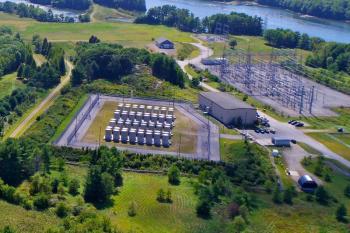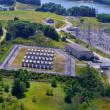Meeting to address storage of spent nuclear waste
The nuclear waste stored at the former Maine Yankee nuclear power plant on Bailey Point, Wiscasset won’t be going anywhere soon, although the Department of Energy (DOE) is showing a renewed interest in finding a permanent storage site.
The DOE and the Office of Nuclear Energy are holding a series of nationwide public comment sessions. One meeting will be held on Thursday, June 2, from 5 to 9:30 p.m. at the Hyatt Regency at One Avenue De Lafayette in Boston. Wiscasset officials have been invited to attend.
As explained on the Office of Nuclear Energy website, http://energy.gov/ne/consent-based-siting, the DOE is in the “initial phase of developing a consent-based process for siting the facilities needed to store and dispose of the nation’s spent nuclear fuel and high-level radioactive waste.” It states, “A consent-based approach to siting relies on understanding the views of the public, stakeholders, and government at the local, state and tribal levels.”
The June hearing is an opportunity for New England communities like Wiscasset where nuclear waste is stored to share “thoughts and perspectives through a facilitated discussion.” DOE will use the input in “the design of a consent-based siting process, which will in turn serve as a framework for engaging with potential host communities in the future.”
Reached for comment, Ben Rines Jr., chairman of the Wiscasset Board of Selectmen, said he hopes someone representing the town can attend the DOE session.
“(The DOE) should hold these meetings in every town like Wiscasset that’s forced to store these nuclear materials. It’s unreasonable to expect people to drive 150 miles to attend a meeting in Boston,” he said.
Other than the distance of traveling to the hearing, Rines felt getting public input was a good idea. “I’ve been pushing to have someone from our Congressional delegation come to one of our selectmen’s meetings to discuss this very issue. The dry cask storage facility at Maine Yankee was never meant to be permanent,” he added.
For the present the waste will remain secured where it is.
“The policy impasse on the national nuclear waste issue continues as it has the past number of years,” Eric Howes, Maine Yankee director of public and government affairs, states in a March 31 email to the Wiscasset Newspaper.
“Congressional reform is needed for meaningful progress to be made on a geologic repository or consolidated interim storage for the removal and disposal of spent nuclear fuel and high-level radioactive waste,” he added.
In December, President Obama signed into law an omnibus appropriations bill funding the federal government through the end of September; Howes noted the bill doesn’t contain funding for a nuclear repository at Yucca Mountain in Nevada.No monies are earmarked for developing an interim storage facility, which according to Howes would provide priority removal of spent nuclear fuel from sites like Maine Yankee that no longer have an operating reactor.
“The pilot project provision is contained in House and Senate legislation introduced in this session of Congress. It has bipartisan support, is a component of the U.S Department of Energy's 2013 Strategy for the Management and Disposal of Used Nuclear Fuel and High-Level Radioactive Waste, and was a key recommendation of the 2012 Blue Ribbon Commission on America's Nuclear Future report,” added Howes.
“A pilot consolidated interim storage facility for spent nuclear fuel could be located on a Department of Energy and/or volunteer private site. Two private entities, currently one in Southeast New Mexico and one in West Texas, have expressed interest in developing such a pilot consolidated interim storage site and both plan to submit license applications to the U.S. Nuclear Regulatory Commission this year for those projects,” he continued.
“Last year's Senate Energy and Water Appropriations Subcommittee bill contained a provision that would have authorized the DOE to enter into agreements with private entities for consolidated interim storage and a bill introduced in the House last fall, with bi-partisan support, contains a similar provision,” Howes said but added the Senate language wasn’t included within the December Omnibus bill and the House bill has since stalled.
“We are grateful to members of the Maine congressional delegation for their support of the pilot project concept and their efforts to press for legislative reforms to overcome the national nuclear waste policy impasse,” he concluded. Howes told the newspaper he planned to attend the DOE’s June 2 meeting in Boston.
Maine Yankee, the state’s only nuclear power plant operated in Wiscasset from 1972 until it was permanently shut down in 1997. Following its decommissioning it was dismantled between 1997 and 2005. It’s one of several former nuclear power plants in New England where spent nuclear waste is being stored above ground using dry casks. Similar storage facilities are located in Connecticut, Vermont and Massachusetts.






















